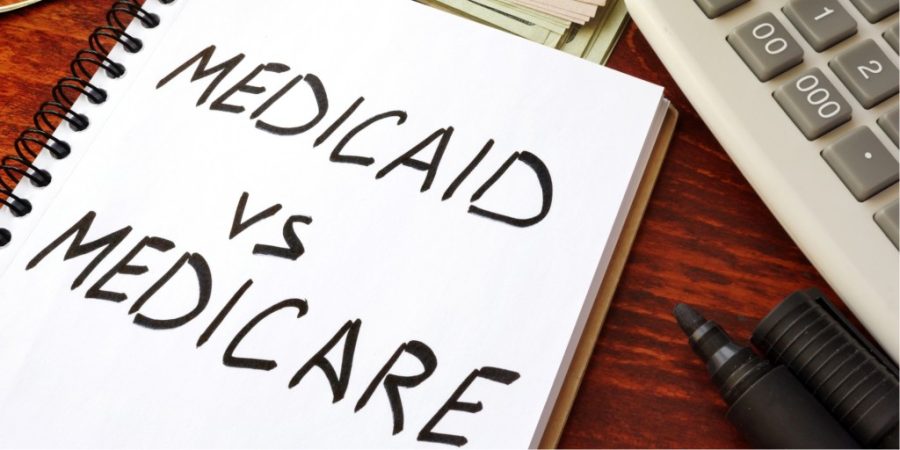
When it comes to choosing the right mental health treatment, you might be wondering exactly which services will have you covered. But how do you know if a treatment center accepts Medicare or Medicaid? And which one will cover the services you need? Here, we explain Medicare vs. Medicaid so that you can receive the right mental health care when you need it.
Table of Contents
The Basics of Medicare vs. Medicaid
Medicare and Medicaid might sound similar, but they provide different coverage opportunities depending on your age, financial situation, and current health needs. In some rare cases, people are dual eligible for both programs. Let’s jump into the main differences below.
Medicare

To start, it’s important to understand that Medicare is a federal health insurance program. This federal program is a fee-for-service health insurance that provides coverage to millions of people in the United States each year. Your specific benefits through Medicare will rely on which type of Medicare you have, including:
- Original Medicare Part A—The Original Medicare package comes with two options: Part A and Part B. Medicare Part A specifically covers hospital insurance. This includes inpatient treatment, hospice, and some home health care. For those with Medicare Part A, you will typically not be responsible for monthly premiums and deductibles, as long as you paid Social Security and Medicare taxes while you were working.
- Original Medicare Part B—Medicare Part B provides medical insurance for specific services that you would get from your health care team as well as outpatient care, preventative services (i.e., vaccines, annual visits, imaging), and medical equipment.
- Medicare Advantage (Part C)—This is a package that includes Parts A, B, and D all in one. In some cases, Medicare Advantage might give the opportunity to lower your out-of-pocket medical costs.
- Medicare Part D (Prescription Drug Coverage)—This specifically covers prescription drug costs, which can be extremely beneficial if you need medication management through your mental health and substance use recovery facility.
The main eligibility requirements for Medicare include individuals who are 65 or older, people under 65 with qualifying disabilities, and those with End-Stage Renal Disease (ESRD).
Medicaid
While Medicare is a health insurance program through the federal government, Medicaid is an assistance-based, state-directed program serving over 70 million people throughout the country. Medicaid is known as a joint federal and state program, which means that coverage varies depending on your location. Each state is required to provide Medicaid coverage to eligible applicants, but they individually decide on the type of coverage the patient receives.
Most commonly, Medicaid is most beneficial for those with very low incomes who would not be able to have access to health care otherwise. Thus, insured patients usually have some small out-of-pocket fees, such as copays for appointments or tests.
However, this means that certain services (such as preventative care and prescription drugs) are sometimes not covered by Medicaid and can create a great financial responsibility for those who need more specialized treatment.
Eligibility for Medicaid once again depends on one’s location and specific situation, but typically takes into account people and families below a particular income level as well as those who have certain disabilities or health issues.
Mental and Behavioral Health Coverage With Medicare vs. Medicaid

Just as with any medical concern, mental health conditions and substance use disorder can require specialized treatment. For example, you might need a program that treats the following:
- Addiction
- Eating disorders
- Bipolar disorder
- Depression
- Anxiety
- Schizophrenia
- And other mental health and behavioral conditions
While Medicaid might offer some coverage for these concerns, knowing exactly what you will be financially responsible for can become quite confusing and frustrating. Luckily, many of the Medicare plan options are made to cover addiction care as well as prescription drug coverage for mental health conditions.
Medicare Parts A and B cover different aspects of mental health and addiction treatment. Most importantly, these programs can help you to receive:
- Drug and alcohol detox
- Inpatient treatment in participating facilities
- Prescription drug addiction treatment
- Partial hospitalization programming (PHP)
- Crisis care
- Dual diagnosis treatment
- Services for after discharge from a treatment center
Always be sure to choose a treatment center that will work with you for affordable, covered, and professional mental health care. With the right services and Medicare eligibility, you will be able to develop valuable skills to live a healthier, happier life without breaking the bank.
Eligible for Medicare? The Blackberry Center Has You Covered!
When you or a loved one needs mental health care, the last thing you want to think about is the financial aspect of treatment. Rather, recovering from mental health conditions should be a time where you can dedicate the energy to learning new skills, working through your program, and readying yourself for the transition into your new life. This is why at the Blackberry Center, we make it a point to prioritize the health and happiness of our patients.
We proudly accept Medicare as one of our verified insurances. Many of our patients who receive Medicare benefits often do not have any out-of-pocket costs at the end of their treatment program.
Find out which mental health services you can receive today by speaking to an admissions specialist at 888-512-9802 or completing our confidential contact form. Without financial strain and worry, we give you the opportunity to focus on what really matters: recovery.
The post Medicare vs. Medicaid: Covering Mental Health & Rehab appeared first on The Blackberry Center of Central Florida.
Source
Original Author: The Blackberry Center

